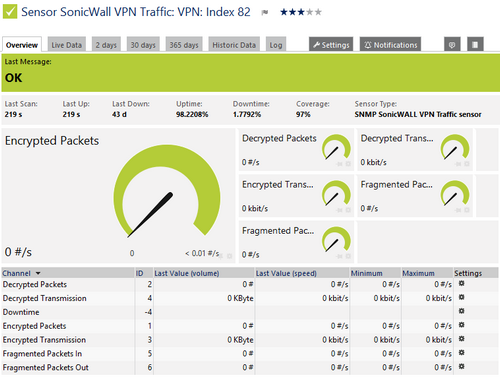What is VPN monitoring? VPN monitoring is the process of keeping an eye on critical metrics to maintain the integrity of the VPN connection and ensure it's robust. In addition, VPN monitoring ensures sensitive data gets transmitted across VPN tunnels without being exploited by intruders. Some crucial parameters to monitor include. ZenMate VPN - The best free Edge VPN extension to hide your IP.
Vpn Monitoring Use Cases
VPN monitoring tool
Merely deploying a VPN alone does not guarantee smooth IT operations. You need to constantly monitor VPN connections (VPN Tunnel Monitoring) for possible bandwidth constraints and security threats. With a VPN monitoring tool, you can fetch VPN logs from your firewall and generate relevant traffic and security reports.
Firewall Analyzer is VPN monitoring software that tracks VPN connections for both remote host VPNs (PPTP, L2TP, and IPsec) and site-to-site VPNs from vendors like Cisco, SonicWall, WatchGuard, and NetScreen. As a VPN tunnel monitoring tool, Firewall Analyzer generates VPN reports that help with:
Vpn Monitor Network Traffic
1. VPN bandwidth management: Monitor VPN activity and usage, identify high bandwidth consumption, track destination URLs, and block unwanted traffic.
2. Real-time VPN traffic monitoring: Keep tabs on the number of active VPN sessions (VPN monitor), and measure the VPN session duration and consumption in real time (VPN tracker).
3. VPN capacity planning: Analyze VPN bandwidth trends,and predict and plan bandwidth capacity needs.

4. VPN security: Identify failed user login attempts and generate alerts on security attacks, viruses, and other anomalies in your network.
What is VPN Monitoring?

Globalization has completely changed the way enterprises are run today. Global conglomerates typically have multiple offices at varied locations and a highly dynamic group of employees. This typically leads to a plethora of complications in a company’s network infrastructure, especially when it comes to sharing files within the organization, across different branches, and with remote employees.
This is where a virtual private network (VPN) comes into play. VPNs allow enterprises to create a secure connection to another network over the internet. Enterprises typically deploy VPNs in the following ways:
Vpn Monitoring Tools
- Site-to-site VPN: Connects entire networks to each other via a dedicated VPN tunnel. For example, connecting a branch office network to a company headquarters network.
- Remote access VPN: Connects individual hosts to private networks. For example, travelers, teleworkers, and mobile users who need to access their company's internal network securely over the internet.

Firewall Analyzer VPN Reports

With Firewall Analyzer's VPN reports, a security administrator can easily discover:
- Who logged into the VPN
- How many VPN login attempts failed
- How many VPN logins occur every day
- How many VPN user sessions are currently live
- Which VPN sessions and users have the longest duration
- How much bandwidth each user consumes via VPN
- What protocols were used to accesstheVPN
- What the VPN usage trends are
- If VPN usage increases during a specific day or hour
A well-planned VPN infrastructure is critical in maintaining employee productivity. Download a free, 30-day trial of Firewall Analyzer to start efficiently monitoring your VPN infrastructure.
If you want monitor both VPN bandwidth and performance, Firewall Analyzer is available as an add-on for OpManager (VPN performance monitoring tool). With OpManager you can monitor VPN performance, track the health of all VPN links and monitor data transmission across VPN tunnels. Thus the OpManager-Firewall Analyzer combination gives all the necessary tools for a security administrator to effectively handle the VPN operations.
Featured links
